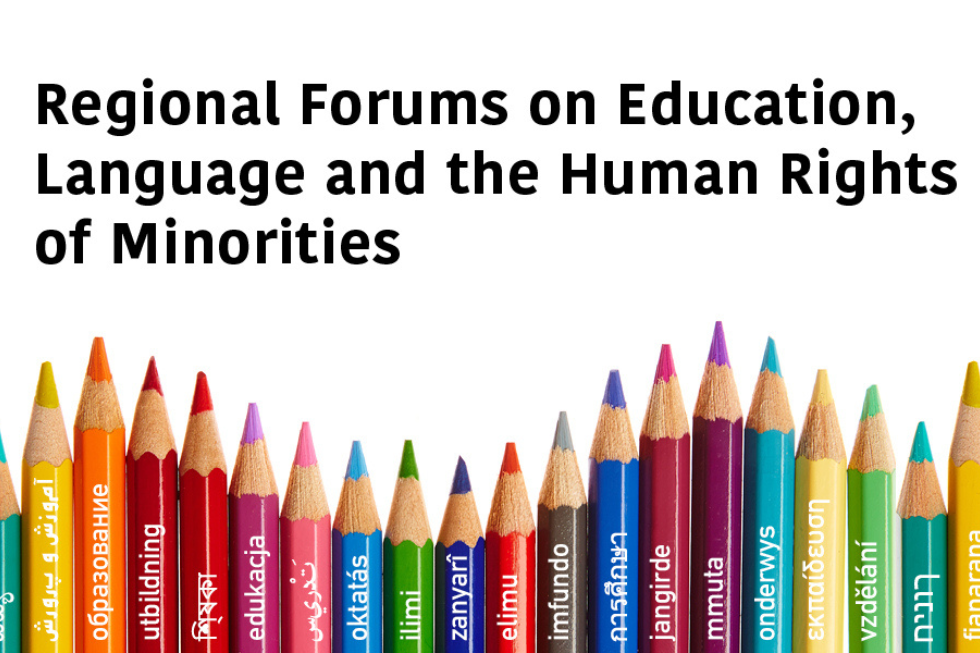
Africa-Middle East Regional Forum on Minority Issues 2019
Education, Language, and the Human Rights of Minorities Tunis, Tunisia
Ez a bejegyzés jelenleg csak angolul érhető el.
Background
The rights of linguistic minorities are human rights that must be respected, including in relation to the appropriate degree of use of minority languages. Education deals with what is perhaps the central linguistic right of minorities, and is also fundamental to the maintenance of linguistic diversity. A language that is not taught is a language that will ultimately vanish. The benefits of education in the mother language are now fairly well established scientifically through studies of minority children in different parts of the world.[1]
In his first report to the UN General Assembly in New York in October 2017, the Special Rapporteur on minority issues (Special Rapporteur), Dr Fernand de Varennes, presented education and the language of minorities as one of the four thematic priorities of his new Human Rights Council mandate. At the November 2018 11th UN Forum on Minority Issues (Forum) in Geneva, the Special Rapporteur confirmed that this topic would be the focus of the 12th session of the Forum in 2019. He also announced at the November 2018 Forum that three regional forums would be organised in 2019 to make the Forum more accessible and responsive to regional contexts and realities. The first regional forum was held in May 2019 at the European Parliament in Brussels, Belgium, the second in September 2019 at Mahidol University in Bangkok, Thailand, and the third, the Africa and Middle East Regional Forum, will be held in October 2019 in Tunis, Tunisia.
Objectives
Three regional forums are to be convened on the topic of education in and teaching of minority languages. Their main aim is to provide regional insights for the development of a set of guidelines or a technical handbook focusing on education in and teaching of minority languages. Discussions at the forums will also inform the recommendations of the 12th session of the UN Forum in 2019.
Other objectives include, in relation to the Africa-Middle East Regional Forum:
– Raising awareness of the ways in which the education in and the teaching of minority languages is anchored in international human rights obligations;
– Providing a platform for more informal exchange on practical challenges of minority language education in Africa and the Middle East among various stakeholders;
– Identifying and discussing the central issues of topical concern related to education and minority languages in Africa and the Middle East;
– Amplifying the voices of minority communities in assessing and improving minority language education policies and offering expert input into their specific concerns.
Participants
The Forum shall be open to the participation of states; intergovernmental organisations including United Nations agencies and mechanisms; national human rights institutions and other relevant national bodies; academics and experts on minority issues; representatives of minorities as well as civil society organisations specialising in minority issues.
Participation is open to individuals involved in minority issues in the Africa and the Middle East regions only (see attached list of countries), and with a clear focus and expertise on the education in and teaching of minority languages.
All individual participants must register online here. Registration opens on Monday 16th September 2019 and closes at midnight CET on Wednesday 23rd October 2019.
All travel related-expenses, visas, accommodation and insurances are the responsibility of the participants. Participants are encouraged to make the necessary visa arrangements, where required, as far in advance as possible. If an invitation letter is required to support a visa application please email urgently.
There is limited funding for a very small number of individual participants. The funds are prioritised for members of minorities to enable greater and diverse participation considering gender and geographic distribution. If you require funding, please email , by no later than Friday 18th October. Applications are encouraged early due to the limited resources available.
Participation at the Africa-Middle East Regional Forum is limited to 70 individuals.
Areas of Discussion
In light of the main objectives of the forum the discussions will address the following overarching themes that reflect the main challenges and issues in the field of minority language education and the human rights of persons belonging to minorities:
- Human Rights pertaining to minority language education
- Public policy objectives and practices for education in minority languages
- Effective practices in education in and teaching of minority languages, including resources and management for the effective implementation
The format of the regional forum will consist of plenaries and 3 working groups addressing the key topics above.
Following the introduction of the key themes by an expert panel, there will be smaller working groups addressing each theme in greater detail. The aim of these discussions will be to develop draft recommendations. Participants are required to select the working group they wish to be part of during the registration process.
Input and Outcomes
The UN Special Rapporteur on Minority Issues encourages wide participation from states, national human rights institutions, civil society representatives, as well as regional and international organizations and other relevant stakeholders.
Based on the dialogue and contributions of the participants, a detailed summary of the discussion will be prepared, as well as concrete, regional specific recommendations.
These will also be available as reference documents for the upcoming UN Forum on Minority Issues to be held at the United Nations in Geneva on 28 and 29 November 2019.
Venue: Golden Tulip El Mechtel, Tunis, Tunisia (subject to change)
Working languages: Arabic, English and French interpretation expected.
[1] Language Rights of Linguistic Minorities: A Practical Guide for Implementation, UN Special Rapporteur on Minority Issues, April 2018.

